As artificial intelligence (AI) is increasingly adopted in various sectors, Education, as one of the most potentially impactful areas, could not remain intact for long. AI has paved the way for numerous applications designed to assist in learning, with AI text-generating tools becoming prevalent.
These tools, with capabilities ranging from summarizing complex articles to generating insightful essay outlines, hold the potential to revolutionize the way students work with their academic assignments. But how aware are students of these tools? How often do they use them, and how do they perceive their effectiveness and relevance to academic integrity?
In order to shed light on these questions, in May 2023, the A*Help team conducted a detailed survey among a diverse group of students. The study aimed to gauge the awareness, understanding, and reception of AI text-generating tools, as well as their practical usage in the students’ studying processes. The findings provide comprehensive data on the use of essay extender generator as well as other types p\of AI in the academic field, highlighting both the benefits and the potential drawbacks.
This article seeks to present a review of these findings, intended for both the general audience and individuals related to education, to paint a clearer picture of the current situation with AI text-generating tools and their integration into student academics. The following sections will closely examine the results, discussing students’ awareness of AI tools, the frequency and purpose of their use, their perceived benefits and disadvantages, and how these tools align with academic integrity standards.
Key takeaways:
- Students are generally aware of various AI tools that could assist their academic work. However, their regular use varies, with grammar checkers used most frequently, followed by citation generators and plagiarism checkers. AI text generation tools are recognized and tried by students but not as regularly integrated into their study routine as other tools.
- AI tools in homework are used primarily for writing assignments, followed by reading and science assignments, coding problems, and professional communication tasks.
- Reasons for refraining from AI use include restrictions posed by school regulations, concerns about the accuracy of AI tools, and lack of knowledge on how to use them. A significant percentage of students prefer to complete their assignments independently.
- Poor fact-checking, lack of citations and formatting in generated content are among the most commonly mentioned limitations and concerns.
Overview
The research was conducted through Pollfish, a mobile survey and market research platform. The system’s methodology focuses on providing more representative results by reaching real consumers in the natural environments of their mobile devices, as opposed to a panel-based approach that relies on participants opting in to take surveys for rewards or incentives. This also allows them to access a much larger and more diverse respondent pool based on demographic, behavioral, and location data.
The study’s central aim was to evaluate the extent of AI’s integration in the educational sphere, specifically among the student population. A diverse group of 600 participants (comprising an equal gender split of 50% females and 50% males) from 43 different US states took part in this survey. Among those surveyed, most were single adults (82.3%) without children (89%) and had annual income under $25000 (31.67%).
A significant majority of the respondents, constituting over 80%, were split equally between school students and university undergraduates, each making up 41.17% of the total. The remaining survey sample was rounded off by middle school students accounting for 9%, technical college attendees representing 11.5%, and post-graduate scholars forming 4.5% of the total participant pool.
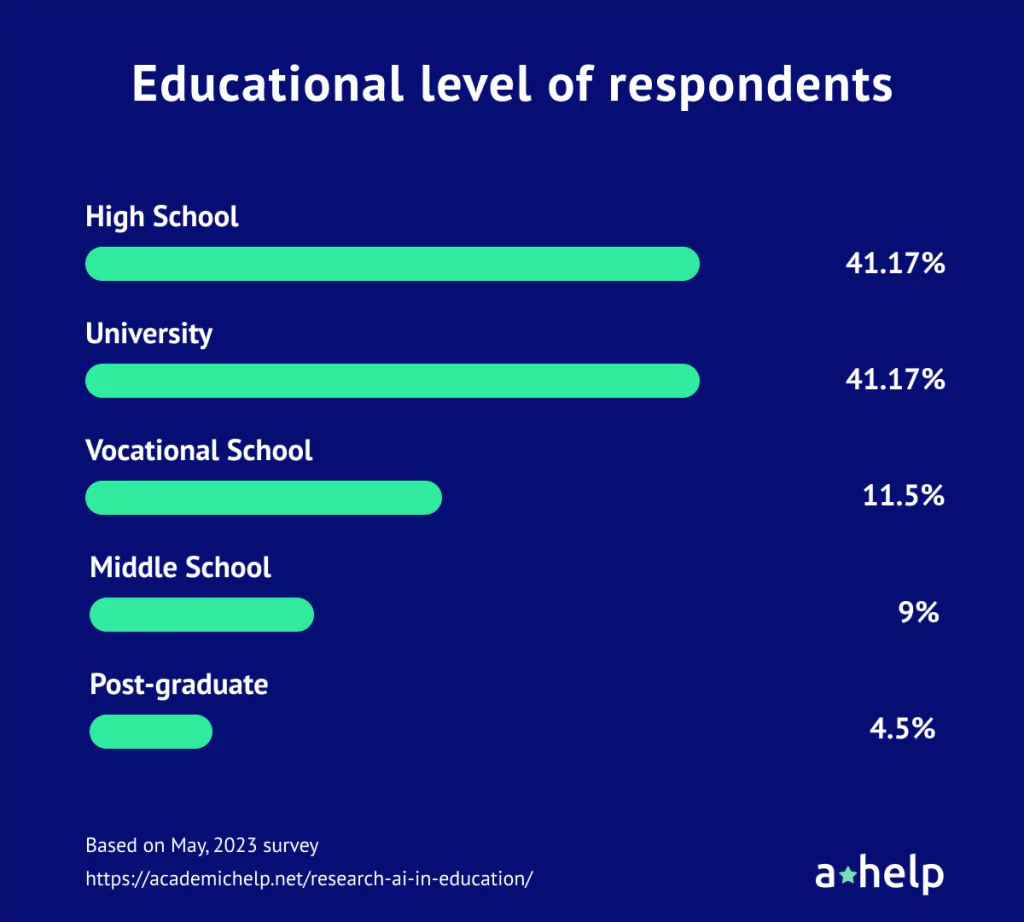
One of the first distinctive questions that we asked participants was to think about the problems and obstacles they frequently encounter during academic writing. The responses were almost equally distributed among several options: the struggle to collect thoughts and start work (30.52%), difficulty in formulating an idea (24.14%), and locating relevant sources of information (22.28%). Among other mentioned issues was lack of time for writing, and English as the language of education was not the first for some responders.
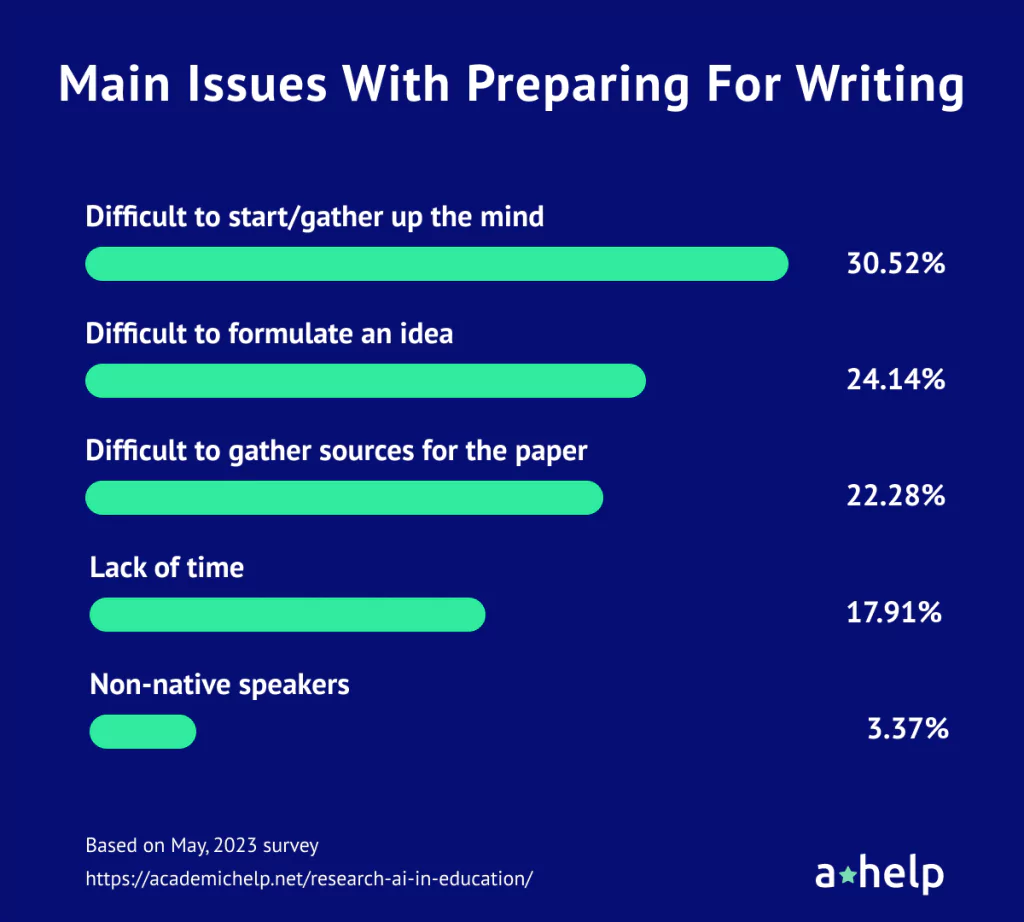
This suggests that while there isn’t a single dominant challenge among the students, many of them encounter similar obstacles, including procrastination, potentially stemming from a lack of motivation, fear of failure, or confusion. It’s noteworthy that these issues typically arise during the early phases of academic writing. The data also argue that a considerable number of participants might have challenges in defining the thesis or main idea for their work. This could be due to insufficient understanding of the topic, lack of research, or weak critical thinking skills.
High awareness. Lower adoption
To understand how students perceive and use AI tools, the study collected data through a set of specific questions. The results reveal students’ awareness and understanding of AI text-generating tools, the extent of their engagement, and regular usage.
Firstly, students’ awareness of the various AI tools and services available (including AI research paper generator technologies) for academic assistance was evaluated. Grammar checkers topped the list, with 81.17% of participants reporting awareness, followed by plagiarism checkers at 71.33% and AI text generation tools at 67.17%. Citation generators were also well-known (67.50%). In comparison, fewer students had heard of text paraphraser services (34.33%), essay writing services or freelance academic assistants (45%), and academic assistance/consulting services (44%). Surprisingly, only 0.67% of the respondents reported that they were unaware of any of the listed tools or services, indicating a high level of overall awareness of such tools among the student population.
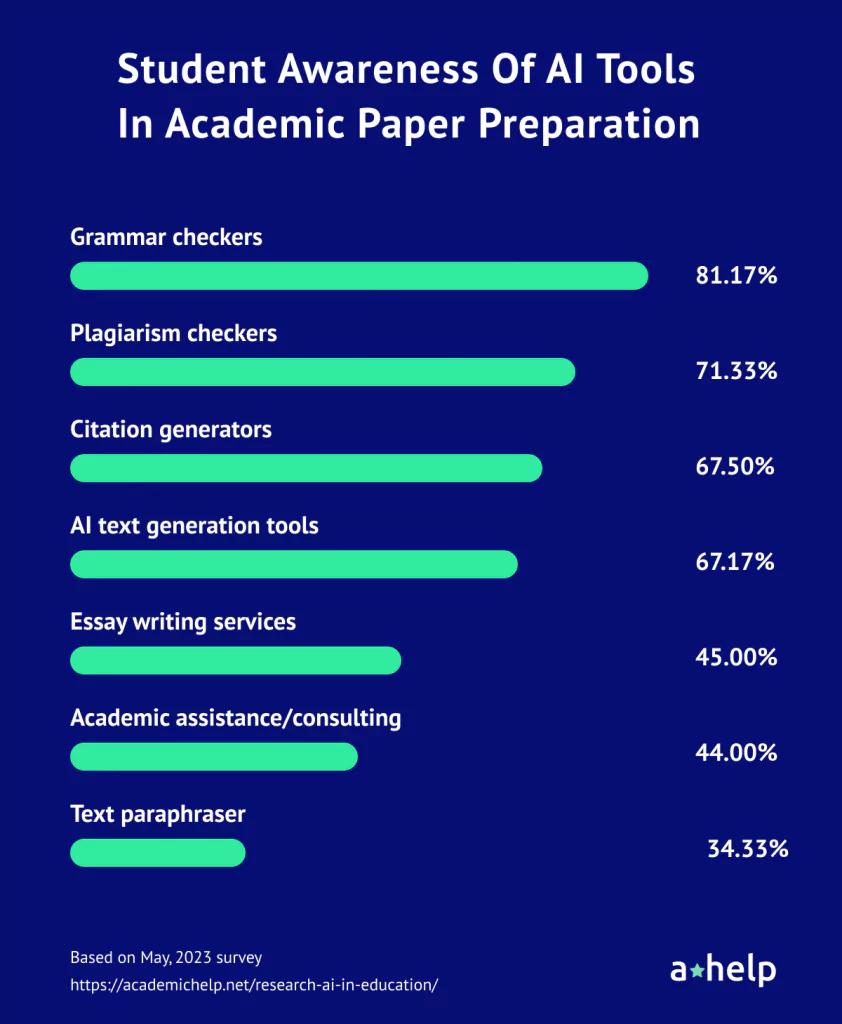
When questioned about the use of these AI tools for academic purposes, grammar checkers were again the most popular choice, with 69.80% of students having tried them. AI text generation tools had been tried by 29.03% of the students, and citation generators by 57.89%. The usage of text paraphraser services, essay writing services, and academic consulting services was significantly lower. Notably, none of the respondents reported not trying any of the tools, which is a testament to the growing adoption and acceptance of AI tools in the academic sphere.
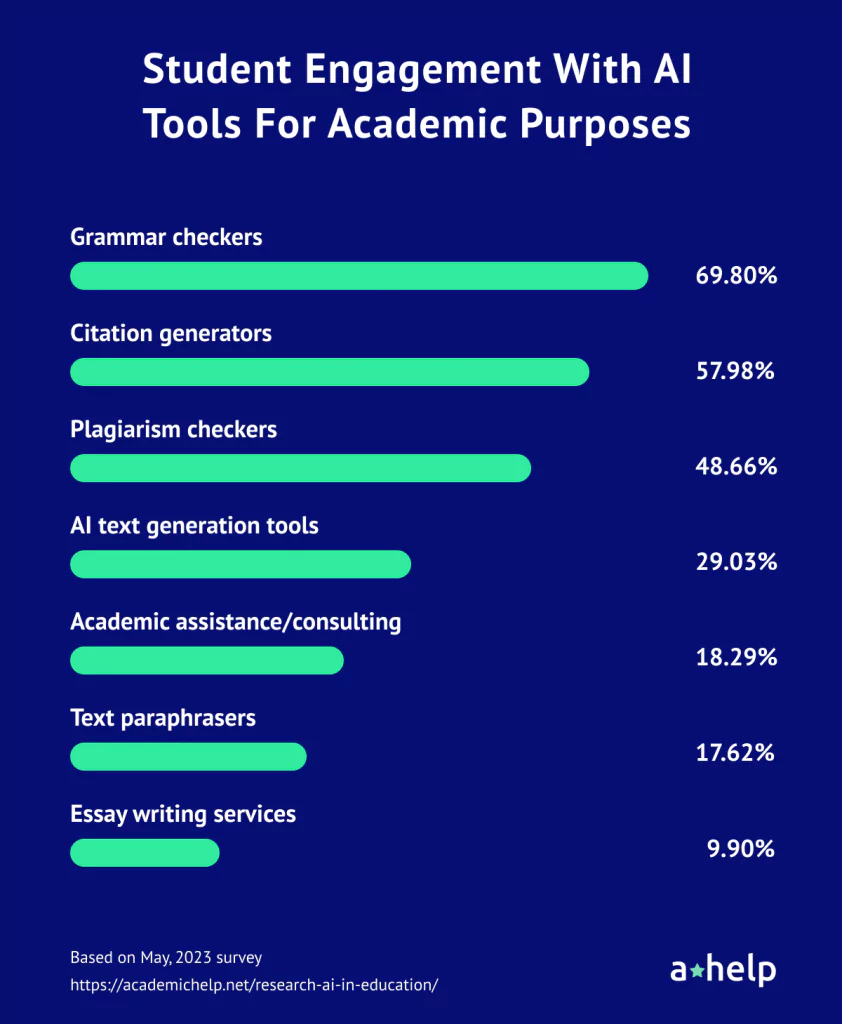
For regular usage, grammar checkers held their position at the top, with 62.92% of the students reporting their daily use, followed by citation generators at 50.50% and plagiarism checkers at 34.06%. AI text generation tools had a significant usage rate as well, with 20.30% of students using them constantly. The regular use of text paraphraser services, essay writing services, and academic assistance services was less than 15%, demonstrating that these tools are not as widely integrated into students’ regular study routines.
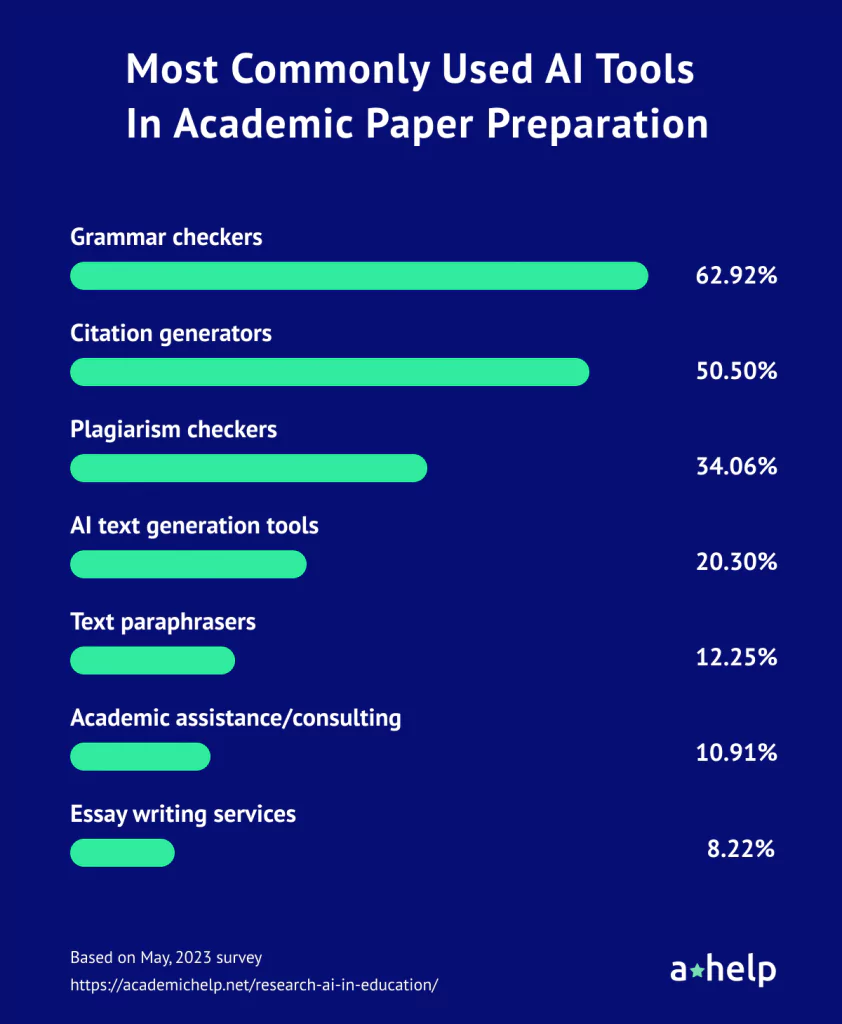
These results exhibit a noticeable pattern, with grammar checkers, plagiarism checkers, and AI text generation tools proving to be the most known, tried, and regularly used. However, while AI text creation services are recognized and have a fair rate of trial, their regular usage falls below the other tools. This suggests that while students recognize their value, they might not fully understand how to integrate them into their regular study routine effectively.
AI tools in homework assignments
To better understand how students utilize AI tools in their academic journey, the study delved into the specifics of their usage in homework assignments. The analysis reveals a range of tasks for which these tools are commonly used, the frequency of usage, and the reasons behind some students’ reluctance to integrate them into their study routine.
When students were asked about which specific AI tools they used for their homework assignments, a wide array of tools was mentioned. However, the most commonly mentioned one was ChatGPT. Other services included Quillbot Grammar Checker, Quillbot Paraphraser, and Grammarly, with some students also mentioning citation generators.
As for the frequency of usage, the majority of students (61.85%) indicated that they occasionally use AI for some assignments. Meanwhile, 30.06% reported frequent usage for almost every project, suggesting a high reliance on these tools. A small percentage (8.09%) had only tried them once.
Regarding the tasks AI tools are used for, 40.26% of respondents reported using them for writing assignments, such as essays and research papers. This speaks to the incredible potential of AI in assisting with tasks that demand considerable time, effort, and linguistic competence. Reading assignments, including summarization tasks, were facilitated by AI for 20.52% of the students. It also proved beneficial in more specialized tasks, such as science assignments (16.36%) and coding problems (10%). Professional communication tasks, such as writing emails or messages, were handled with AI tools by 12.99% of students.
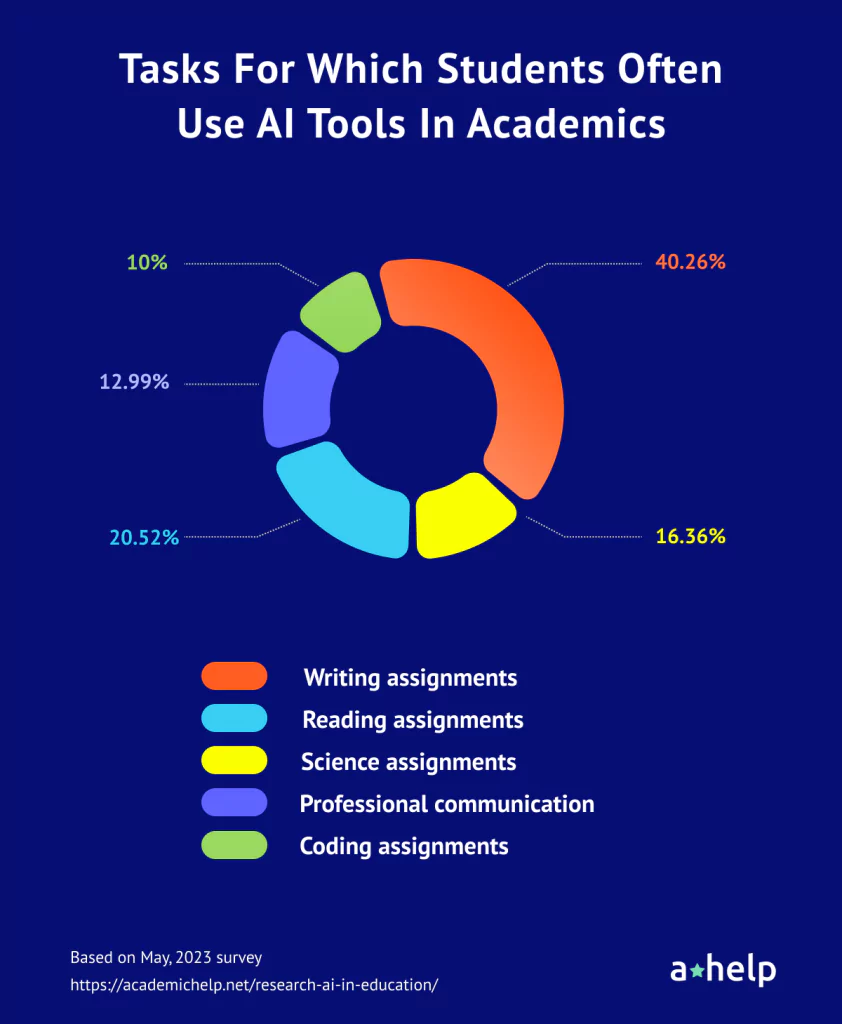
Despite the growing use of AI-powered services, some students still refrain from utilizing them for various reasons. The majority (58.16%) preferred doing their assignments independently, emphasizing the importance of personal effort and learning in the academic process. Meanwhile, 42.55% cited their school’s regulations against AI tools as the main reason for not using them. Concerns about their accuracy also surfaced, with 36.64% expressing doubts. A considerable portion (22.46%) admitted that they don’t know how to use AI for their homework assignments, highlighting an opportunity for educational institutions and AI tool providers to raise awareness and offer training in this area. A few students expressed concerns about over-reliance on technology and potential issues with academic integrity, such as plagiarism.
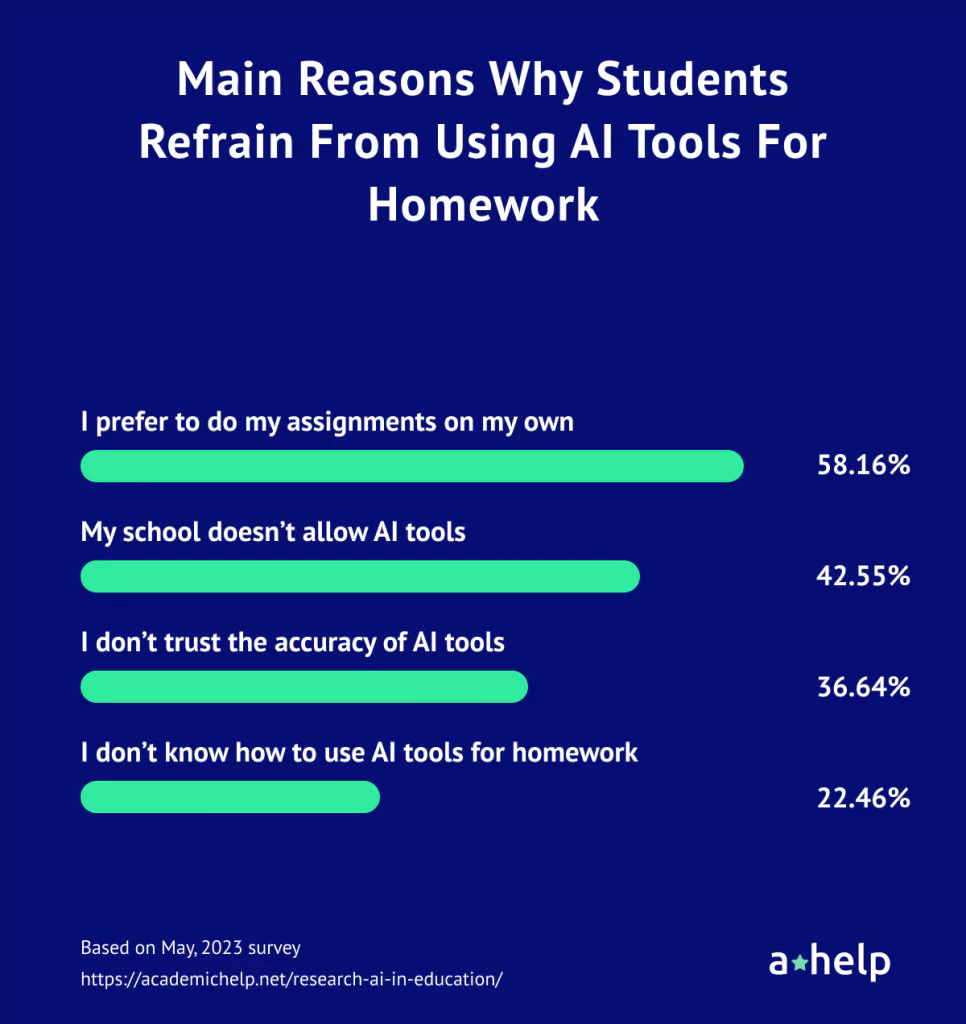
Concerns and limitations
The collected data have identified several limitations and common concerns associated with AI tools. The most frequently mentioned concern was the issue of poor fact-checking (31.21%), indicating a perceived inability of AI tools to adequately verify and evaluate the factual content of the generated text. This suggests that students are wary of the accuracy and reliability of the information provided by these tools, which is an essential factor in the academic environment.
Close to this, another significant problem raised was the lack of citations in the generated output (29.48%). The academic world heavily relies on well-sourced material, and any contribution without appropriate citations can be seen as less credible or, in the worst case, plagiarism. Hence, this limitation can significantly hinder the usefulness of AI in academic work.
Nearly the same portion of students (29.48%) stated that they did not know any weaknesses of AI tools. This could mean two things: either they have not yet used AI enough to notice any significant drawbacks, or they are not aware of the potential pitfalls and limitations.
The absence of formatting in required academic styles, such as APA and MLA, was also a notable concern (25.43%). These formatting styles, often mandatory in academia, help standardize the presentation of research papers and make it easier for peers to understand the structure and follow the sources used in the work.
These findings illustrate that while AI tools have made significant strides in assisting students with their academic tasks, there are several areas where they can still improve.
The Impact and Integrity Matters
The survey included questions aimed at understanding the impact of AI tools on the paper preparation process, whether these services are considered in line with academic integrity standards, and how helpful they are perceived while writing academic papers.
The majority of students agreed or strongly agreed that AI text generation tools (83.83%), Grammar Checkers (74.84%), Text Paraphraser Services (72.17%), Essay Writing Services (75.5%), Citations Generators (74.83%), and Academic Assistance/Consulting Services (65.17%) reduce the time of paper preparation. In contrast, Plagiarism Checkers were perceived as less time-saving, with only 53.5% of students agreeing to their time-reduction capacity. This might be because plagiarism checking is often a final step that adds to the time instead of reducing it.
When it comes to meeting academic integrity standards, Grammar Checkers (91.34%), Plagiarism Checkers (80%), and Academic Assistance/Consulting Services (77.5%) were perceived as most probably or definitely in line with institutional guidelines. Citations Generators also ranked high (77.5%).
On the other hand, AI Text Generation Tools and Essay Writing Services sparked some controversy, with 50.66% of students stating those are probably or definitely forbidden.
In terms of overall helpfulness, Grammar Checkers led the way, with a whopping 94.16% of respondents considering them extremely or somewhat helpful. Citations Generators (87.33%) and Plagiarism Checkers (79.67%) were also highly appreciated. AI Text Generation Tools (73.17%) and Academic Assistance/Consulting Services (78.5%) found significant approval, too. A majority deemed text Paraphraser Services and Essay Writing Services helpful, with respective rates of 73.67% and 70.5%.
To summarize, these AI services are generally perceived positively by students, who see them as time-saving and helpful. However, the concerns around academic integrity associated with AI Text Generation Tools and Essay Writing Services indicate a need for better communication around their ethical use and potential improvements to ensure they support academic honesty. These findings highlight the necessity for educational institutions to provide more explicit guidelines on using AI instruments, as well as for developers to work closely with educational institutions to ensure their products support and uphold academic integrity.
Conclusions
This comprehensive survey provides revealing insights into the integration, awareness, and use of AI text-generating tools in the student population. The study highlights students’ understanding and familiarity with various AI-powered services. However, a noticeable disparity between awareness and regular adoption, especially for AI text-generating mechanisms, suggests potential barriers to full integration.
Despite this, many students recognize the value of AI in assisting with academic tasks such as writing assignments, reading assignments, and even more specialized tasks such as coding problems. Nevertheless, concerns about accuracy, adherence to academic integrity standards, and lack of awareness of effectively utilizing these tools also emerged as significant factors limiting their adoption.
While AI tools are generally perceived positively for their time-saving and helpful attributes, concerns about academic integrity standards and ethical use, particularly in the case of AI text generation process and essay writing services, underline the need for clearer guidelines and communication from educational institutions and tool providers.
Overall, the study indicates a promising trend toward integrating AI in the educational sphere, with room for growth and improvement. As AI continues to evolve and adapt to the academic environment, it can revolutionize how students approach their academics, augmenting their capabilities and transforming their learning experience. Yet, it remains essential for the developers and educators to address the concerns and limitations, ensuring that this technology supports academic honesty, offers reliable information, and is used ethically and effectively in education.
Thank you!
We appreciate you taking the time to read this analysis of the survey Student Perspectives on AI Tools in Academia in 2023!
For questions about this report or data, please reach out to Nayeli Ellen at [email protected].
You are welcome to share and republish all of the charts on this page. This data was collected between May 15th, 2022, and May 30th, 2023.
